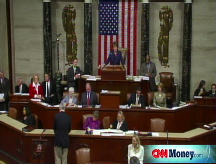Bailout aimed at Wall Street - poll
CNN/Opinion Research survey shows only 40% of Americans think the $700 billion plan was aimed at helping Main Street.
NEW YORK (CNNMoney.com) -- The government said last week's $700 billion financial bailout was necessary to help Wall Street and Main Street alike, but most Americans don't think the plan was intended to benefit them, according to a survey released Tuesday.
In a CNN/Opinion Research Corp. poll, only 40% of Americans think the legislation was an attempt to rescue the economy in order to help ordinary taxpayers. Instead, 53% saw the bill as mostly a bailout for Wall Street.
Politicians said the bill was a last-resort move to thaw the frozen credit markets. They said the credit crunch could eventually hurt everyday Americans, because banks would not issue loans for cars, tuition or homes. Lawmakers said businesses would also be forced to cut payrolls, leaving hundreds of thousands more Americans out of work.
"By coming together on this legislation, we have acted boldly to prevent the crisis on Wall Street from becoming a crisis in communities across our country," President Bush said last week after the House voted 263 to 171 to pass the measure.
But taxpayers weren't buying it. The survey of more than 1,000 Americans, conducted Oct. 3-5, found that 59% thought the bill would treat taxpayers unfairly. Almost as many - 52% - thought the bill would waste money.
Many economists disagree, arguing that the government was the only buyer left who could help banks from dragging their anchor.
"If companies continue to write down loans, they take a hit to their capital, and they're going to make fewer loans in the future or charge a higher interest on loans that they do make," said John Silvia, chief economist at Wachovia. "Most Americans don't put the two together."
Still, taxpayers didn't think the bill was a good investment. Some 20% believed the government will not get back any of the $700 billion it plans to invest in troubled asset-backed securities, and about half of those surveyed thought the government would get only a little money back.
Just 25% said the Treasury would get most of its investment back, and only 4% said it would get it all back.
"At the end of the day, it's going to be an expensive plan, but the government had to step in," said Silvia. "It's a difficult thing to estimate, but the government could sell the assets at a decent price once the market's better."
Though skeptical, Americans were somewhat confident that the bill would do some good. Of those polled, 51% said they believed the legislation would help ordinary Americans who have mortgage problems keep their homes.
Congressional Democrats succeeded in amending the original Bush administration proposal by adding in provisions that support homeowners at risk of foreclosure, in part by giving the government more say in how loans for troubled borrowers are modified so people can stay in their homes. ![]()


